-
01-01-2018
El cuidado en la Atención Primaria de Salud: vivencia de las enfermeras
Revista Brasileira de Enfermagem. 2018;71:531-537
Abstract
El cuidado en la Atención Primaria de Salud: vivencia de las enfermeras
Revista Brasileira de Enfermagem. 2018;71:531-537
DOI 10.1590/0034-7167-2016-0244
Views0See moreRESUMEN
Objetivo:
comprender el significado de realizar cuidados de enfermería en la Atención Primaria de Salud desde la perspectiva de las enfermeras chilenas.
Método:
investigación cualitativa con enfoque desde la fenomenología social de Alfred Schütz. La recolección de datos fue realizada entre enero y abril del 2013, a través de entrevista con 13 enfermeras de Atención Primaria en Chile.
Resultados:
las enfermeras perciben el cuidado como una experiencia gratificante considerando un encuentro de subjetividades. Sin embargo, se sienten sobrecargadas por múltiples funciones a realizar y por presiones jerárquicas en el logro de las metas. Aspiran implementar cuidados innovadores manifiestados por el deseo de superar el cuidado tradicional y la eficiencia de la gestión de los diversos niveles de atención de la salud.
Conclusión:
es importante discutir estos resultados en el contexto de la asistencia y especialmente en la formación, con el fin de preparar mejor a las enfermeras que brindarán cuidados en este nivel de atención.
-
RESEARCH01-01-2018
Obstacles in the detection and reporting of tuberculosis cases: a discursive analysis
Revista Brasileira de Enfermagem. 2018;71:523-530
Abstract
RESEARCHObstacles in the detection and reporting of tuberculosis cases: a discursive analysis
Revista Brasileira de Enfermagem. 2018;71:523-530
DOI 10.1590/0034-7167-2016-0673
Views0See moreABSTRACT
Objective:
To analyze the discourses of health professionals about the obstacles in the process of detection and reporting of tuberculosis cases in Mozambique.
Method:
Qualitative exploratory study with a theoretical-methodological approach of Discourse Analysis of French matrix. The study was conducted in Mozambique in 2014 at three levels: central, provincial and district. The study included 15 health professionals, 4 physicians, 6 technicians and 5 nursing professionals, who worked in the National Tuberculosis Control Program, with more than 1 year of experience.
Result:
The following discursive blocks emerged: Detection of tuberculosis cases in laboratories; Underreporting of tuberculosis cases; Obstacles to detect cases of tuberculosis: long distances and lack of transport; and Reporting of cases for decision making.
Final considerations:
The discourses analyzed point to the ideological affiliation that includes the lack of investment policies in the health sector and the political commitment as basic obstacles in the detection and reporting of tuberculosis cases.
-
RESEARCH01-01-2018
Quality of life of elderly people living with HIV/AIDS in outpatient follow-up
Revista Brasileira de Enfermagem. 2018;71:513-522
Abstract
RESEARCHQuality of life of elderly people living with HIV/AIDS in outpatient follow-up
Revista Brasileira de Enfermagem. 2018;71:513-522
DOI 10.1590/0034-7167-2017-0127
Views0See moreABSTRACT
Objective:
To analyze factors related to the quality of life of elderly people living with HIV/AIDS.
Method:
A cross-sectional study was carried out with people aged 50 years or more in a specialized outpatient clinic. The data collection was by means of an interview. For the analysis of data and characterization of the sample, descriptive statistics and comparison tests were used. The project met the ethical requirements.
Results:
Participants were 81 users aged 50 to 75 years, mean age was 57.8 (± 6.1) years, 71.6% of whom were men. There was a statistically significant relationship with the quality of life, the following variables: gender, children, occupation, religion, diagnosis time, HIV exposure, adverse effects, treatment interruption, viral load counts, hospitalization, dependence for daily activities and use of drugs.
Conclusion:
The results suggest that the quality of life deficit is related not only to physical changes, but to the anguish and stigma related to HIV/AIDS.
-
RESEARCH01-01-2018
Alcohol consumption, Quality of Life and Brief Intervention among Nursing university students
Revista Brasileira de Enfermagem. 2018;71:505-512
Abstract
RESEARCHAlcohol consumption, Quality of Life and Brief Intervention among Nursing university students
Revista Brasileira de Enfermagem. 2018;71:505-512
DOI 10.1590/0034-7167-2017-0692
Views0See moreABSTRACT
Objective:
To evaluate nursing university students’ alcohol consumption patterns, Brief Intervention and Quality of Life (QoL).
Method:
This is a prospective and longitudinal study containing sociodemographic, economic information concerning alcoholic beverages, BI and QoL evaluation among 281 nursing university students. Since surveys have been applied, seminars have been given and consumption patterns have been discussed, an educational material was delivered after university students’ revaluation and BI reinforcement. Descriptive and analytical statistics have been conducted.
Results:
90% of the students have already consumed alcohol and 20.6% that consumed for the first time and abused alcohol were minors. After the implementation of BI, the alcohol consumption has decreased among university students. Besides the vitality, generate state of health, and emotional aspects have decreased, mental health was substantially low among the students that used to drink.
Conclusion:
BI contributes to decrease alcoholic beverages consumption and promotes health.
-
RESEARCH01-01-2018
Reflections and collective production about being a municipal health counselor
Revista Brasileira de Enfermagem. 2018;71:496-504
Abstract
RESEARCHReflections and collective production about being a municipal health counselor
Revista Brasileira de Enfermagem. 2018;71:496-504
DOI 10.1590/0034-7167-2017-0369
Views0See moreABSTRACT
Objective:
to identify the participation dynamics of a municipal council and to develop a critical-reflexive process on “being a counselor”, identifying weaknesses and possibilities of this council, in addition to collectively generating new knowledge and (re)elaborating the MHC Ordinary Law.
Method:
Convergent care research, including documentary analysis, non-participant observation and thematic workshops. The research was carried out in 2016, with municipal health counselors from a city in the Western Region of Santa Catarina.
Results:
this study made it possible to identify forms of social participation that should be strengthened in the performance of social power, to reflect and share individual experiences, to anchor them in the current legislation, and to build knowledge that enabled the elaboration/organization of a product – a new text for the Ordinary Law of the Council, adjusted to current legislation.
Final considerations:
There is a need to increase participation, considering the presence of the counselors in the meetings, the effective representation and a greater interaction in the discussions and deliberations of the council.
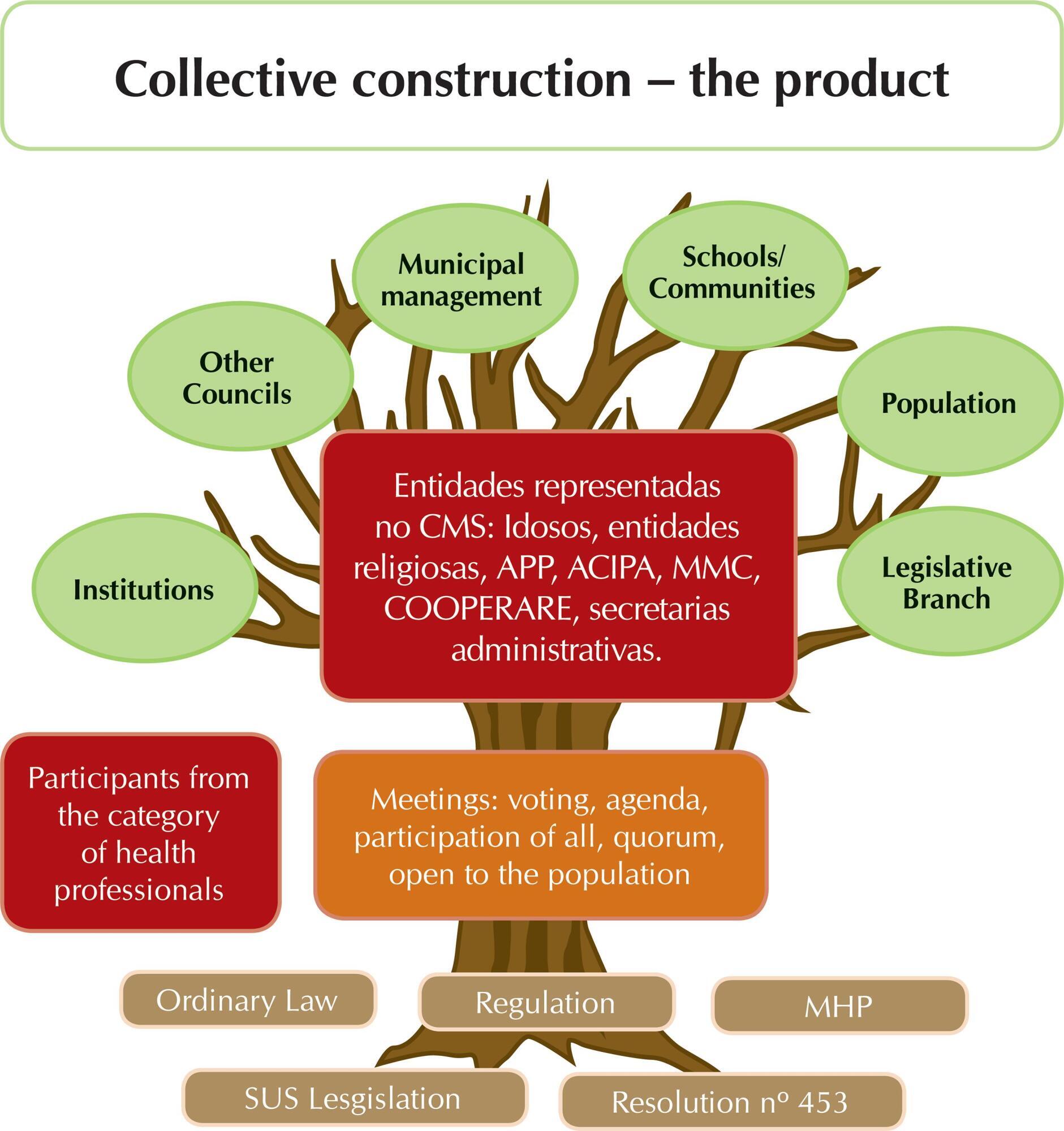
-
RESEARCH01-01-2018
Social network: evaluation of the support or containment contexts of lesbian mothers
Revista Brasileira de Enfermagem. 2018;71:490-495
Abstract
RESEARCHSocial network: evaluation of the support or containment contexts of lesbian mothers
Revista Brasileira de Enfermagem. 2018;71:490-495
DOI 10.1590/0034-7167-2017-0419
Views0See moreABSTRACT
Objective:
To evaluate the social network of lesbian mothers, from the social contexts of support or restraint.
Method:
Descriptive, exploratory study, of qualitative approach, based on the theoretical reference of Social Network, with eight lesbian mothers selected through Snowball technique, using semi-structured interview. Data analysis was performed with IRAMUTEQ software, through Similarity Analysis.
Results:
The social network is configured as: 1) Emotional distance and non-acceptance of motherhood by the family members – primary network elements; 2) Interference in the socio-cultural medium for the effectiveness of the mother-child bond – secondary network elements.
Final considerations:
Social network is grounded on trivialized and negative conceptions that highlight prejudice and disrespect. The discussion of this theme contributes to a greater visibility of those new family arrangements as well as to reduce stigmas e prejudices that pervade the social network components of these women.
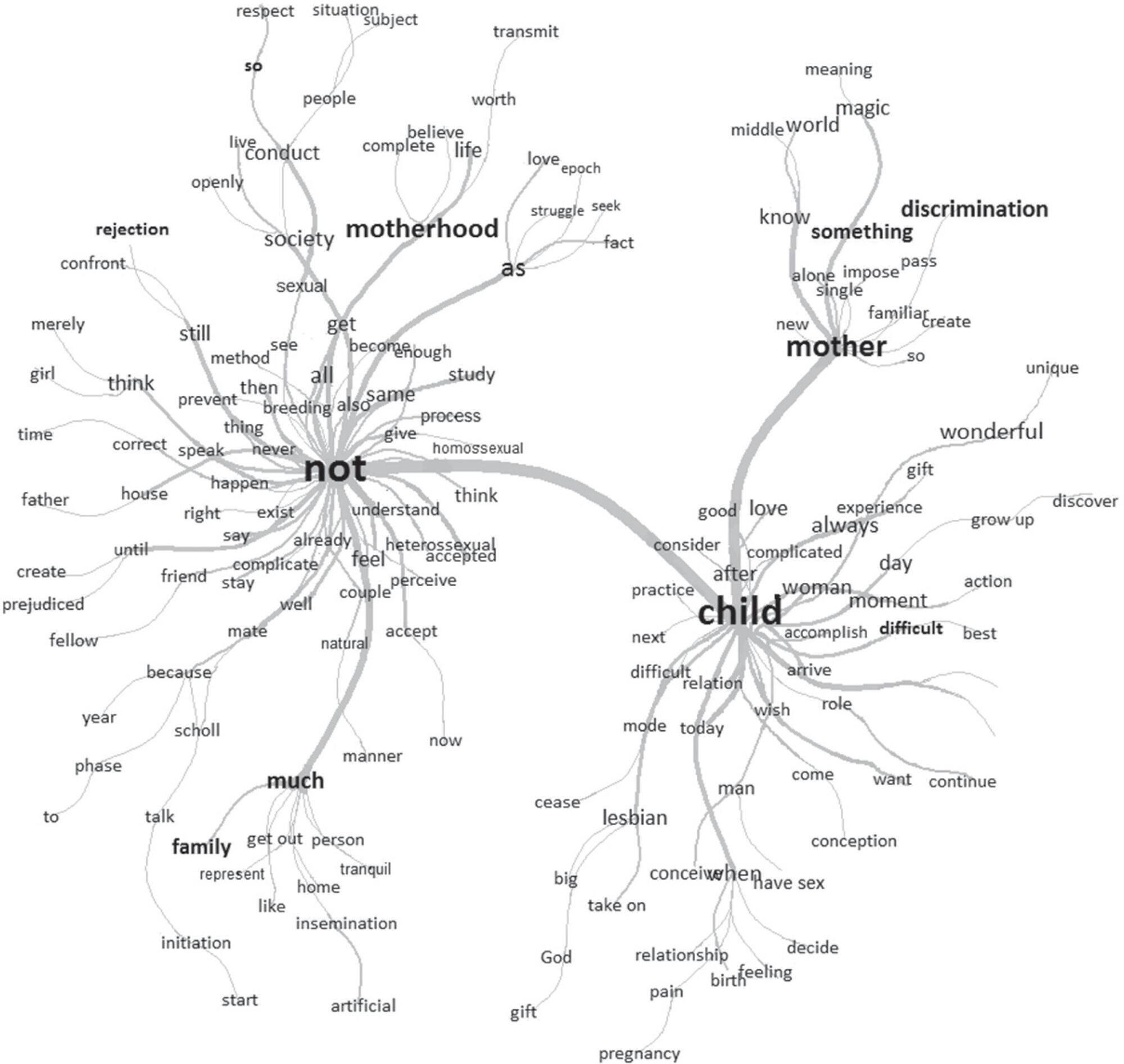
-
RESEARCH01-01-2018
Wellness room as a strategy to reduce occupational stress: quasi-experimental study
Revista Brasileira de Enfermagem. 2018;71:483-489
Abstract
RESEARCHWellness room as a strategy to reduce occupational stress: quasi-experimental study
Revista Brasileira de Enfermagem. 2018;71:483-489
DOI 10.1590/0034-7167-2017-0572
Views0See moreABSTRACT
Objective:
To compare occupational stress levels of nurse staff working in the surgical unit before and after the intervention “wellness room”.
Method:
Quasi-experimental study with a sample of 60 nurse staff working in a surgical unit of a teaching hospital in the Southern Region of Brazil. The intervention was conducted in a room in the workplace for six months and consisted of sections of aesthetic care, relaxation, lectures and workshops to reduce occupational stress. Data were collected through the Demand-Control-Support Questionnaire before and after the intervention, and the comparative analysis was performed by the Wilcoxon test.
Results:
After the intervention, there was a decrease in demand and an increase in control and in the social support received at work in all professional categories, but the differences were not statistically significant.
Conclusion:
The intervention “wellness room” reduced occupational stress levels in the sample studied; however, it was not a significant decrease.
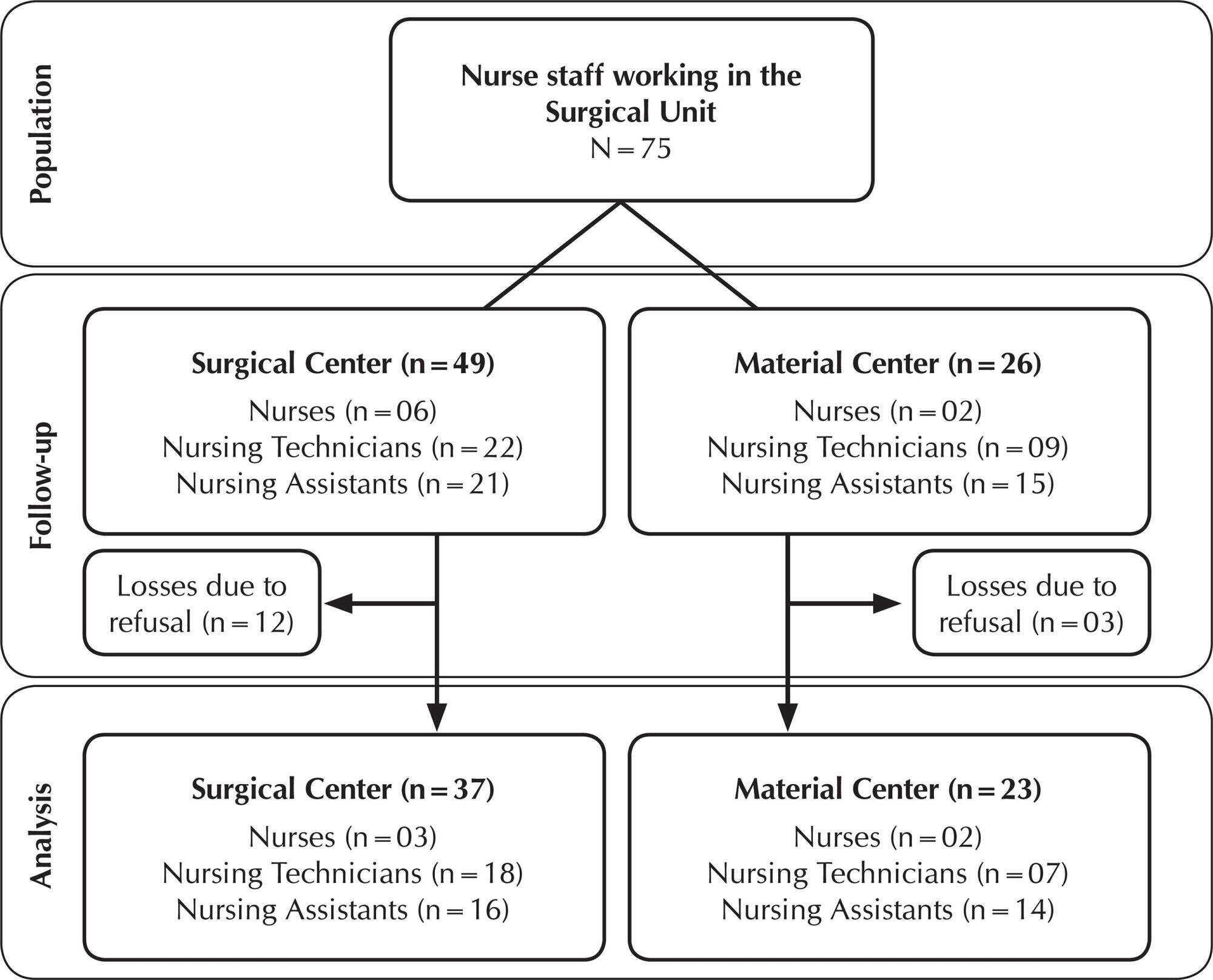
-
RESEARCH01-01-2018
Characterization of users at risk of developing diabetes: a cross-sectional study
Revista Brasileira de Enfermagem. 2018;71:475-482
Abstract
RESEARCHCharacterization of users at risk of developing diabetes: a cross-sectional study
Revista Brasileira de Enfermagem. 2018;71:475-482
DOI 10.1590/0034-7167-2017-0776
Views0See moreABSTRACT
Objective:
To characterize the profile of users at risk of developing diabetes mellitus type 2 according to sociodemographic and clinical variables.
Method:
Cross-sectional study, descriptive, quantitative approach conducted with 266 users of Basic Care. Inferential statistics analysis, calculating the crude prevalence ratio with confidence interval of 95% and Kruskal-Wallis test, and application of the multivariate technique simple Correspondence Analysis.
Results:
It was noted that 83.1% were women and 36.4% frequented the Family Health Unit from 1 to 5 years. Regarding the factors associated with diabetes mellitus type 2, 66.5% of the users were overweight and 77.9% were rated with central obesity. The great majority, 77.4%, did not practice physical activities and 21.1% had altered glycemia.
Conclusion:
The results showed that many risk factors for developing diabetes mellitus type 2 were among the population of the study.
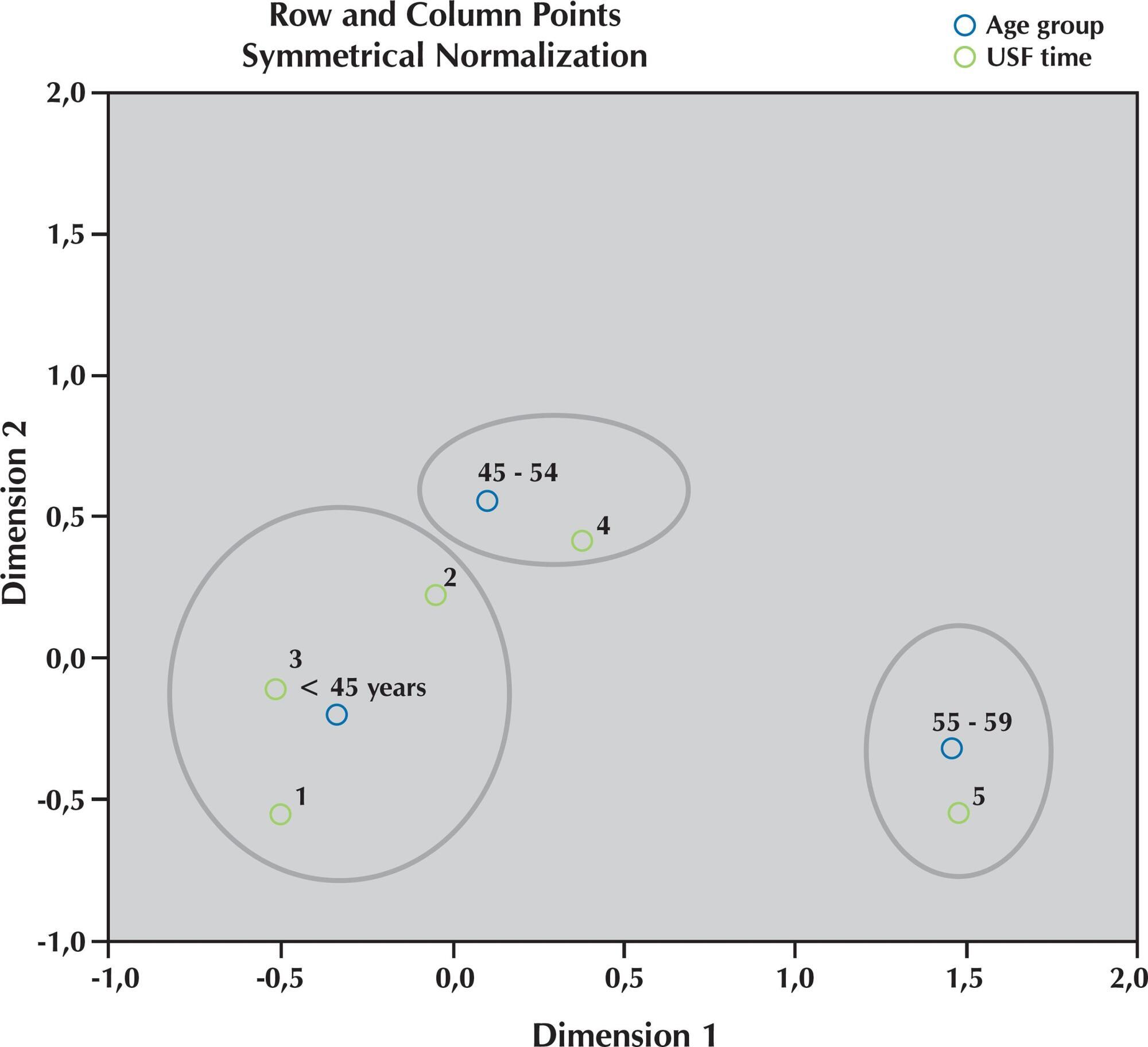
-
01-01-2016
Nursing care in Specialized HIV/Aids Outpatient Services
Revista Brasileira de Enfermagem. 2016;69(3):515-521
Abstract
Nursing care in Specialized HIV/Aids Outpatient Services
Revista Brasileira de Enfermagem. 2016;69(3):515-521
DOI 10.1590/0034-7167.2016690314i
Views1See moreABSTRACT
Objective:
to analyze the discourses about the care provided by nurses operating in Specialized HIV/Aids Outpatient Services in four public institutions of the city of Fortaleza, Ceará, Brazil.
Method:
descriptive and exploratory study with a qualitative approach, which used as a method the discourse analysis.
Results:
when titling the “care as negative”, such title came from the analogy proposed by Freud (1912) with the photographic negative, represented by what that care can configure from the unconscious movement, since nurses did not perceive themselves in the care actions developed by supporting the work of other occupational categories, contributing to maintain the ideology of biomedicine.
Conclusion:
it is necessary to justify and theorize a nursing clinical practice from epistemological issues of the profession, in such a way that nurses can understand their relevance within the care provided.
-
RESEARCH01-01-2017
Guide of attributes of the nurse’s political competence: a methodological study
Revista Brasileira de Enfermagem. 2017;70(3):526-534
Abstract
RESEARCHGuide of attributes of the nurse’s political competence: a methodological study
Revista Brasileira de Enfermagem. 2017;70(3):526-534
DOI 10.1590/0034-7167-2016-0483
Views0See moreABSTRACT
Objective:
To build and validate a guide of attributes of the nurse’s political competence.
Method:
Methodological research. This study comprised the construction of the instrument through literature review; experts validation of pre-established attributes for composing the guide; and clinical validation in the nurses work environment/reality. The data collection took place in the months from August to October 2014, and the analysis was based on the content analysis of Bardin and use of Epi info 3.5. All ethical precepts have been complied with.
Results:
From 29 attributes found in the literature, 25 have been validated by experts. Clinical/practical validation involved the participation of 43 nurses, who observed that the attributes are not articulated with the professional practices developed by them.
Conclusion:
The attributes of the nurse’s political competence were identified with support of literature. It is concluded that the professionals still have limited and fragmented perception of political competence, expressing difficulty/limitation.
-
ORIGINAL ARTICLE06-16-2021
Direct cost of Peripherally Inserted Central Venous Catheter insertion by nurses in hospitalized adults
Revista Brasileira de Enfermagem. 2021;74(2):e20190663
Abstract
ORIGINAL ARTICLEDirect cost of Peripherally Inserted Central Venous Catheter insertion by nurses in hospitalized adults
Revista Brasileira de Enfermagem. 2021;74(2):e20190663
DOI 10.1590/0034-7167-2019-0663
Views0See moreABSTRACT
Objectives:
to analyze the average direct cost of PICC insertion by nurses.
Methods:
this is a unique case study with a quantitative approach. The observation took place in a public hospital, collecting information on inputs used and procedure length. For the calculation of costs, time was multiplied by nurses’ costs plus supplies. The US dollar was used to present the calculations. In the analysis, descriptive statistics of measures of central tendency and variability were used.
Results:
the sample corresponded to 139 observations. The average cost of PICC insertion totaled US$286.04, with 90.8% of materials, mainly catheter, and 9.2% of the labor. The procedure took an average of 50 minutes, at US$0.26 per minute for nurses. Conclusions: the average direct cost of PICC insertion was US$286.04, with emphasis on the catheter. The results can support management decisions for adequate material and professional sizing.
-
REVIEW02-06-2023
Elements for assistance to patients with hematological malignancies to propose care lines: a scoping review
Revista Brasileira de Enfermagem. 2023;76(2):e20220152
Abstract
REVIEWElements for assistance to patients with hematological malignancies to propose care lines: a scoping review
Revista Brasileira de Enfermagem. 2023;76(2):e20220152
DOI 10.1590/0034-7167-2022-0152
Views0See moreABSTRACT
Objectives:
to identify the elements for assistance to patients with hematological malignancies to propose a care line.
Methods:
this is a scoping review, anchored in the JBI theoretical framework, with searches carried out in April 2021, in eight electronic databases and 10 repositories of theses and dissertations.
Results:
the final sample consisted of 93 studies, and the main forms of assistance provided that can support a care line for this public were imaging tests, immunophenotyping, chemotherapy regimens, radiotherapy, infection management, assessment of nutritional status, maintenance of oral function, symptom management and screening for second malignancies.
Conclusions:
the elaboration of a care line for onco-hematologic patients is necessary, considering the complexity surrounding the diagnosis and treatment of hematologic malignancies, in addition to the difficulties that are imposed in relation to access and continuity of care in the network.
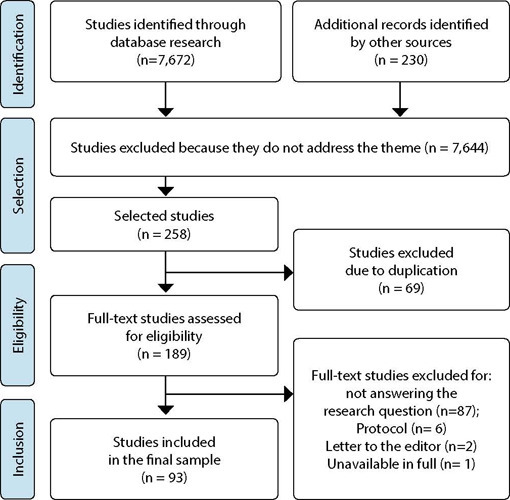
-
ORIGINAL ARTICLE03-27-2023
Prevalence of characteristics associated with sarcopenia in elders: a cross-sectional study
Revista Brasileira de Enfermagem. 2023;76(2):e20220209
Abstract
ORIGINAL ARTICLEPrevalence of characteristics associated with sarcopenia in elders: a cross-sectional study
Revista Brasileira de Enfermagem. 2023;76(2):e20220209
DOI 10.1590/0034-7167-2022-0209
Views0See moreABSTRACT
Objectives:
to identify the prevalence and characteristics associated with sarcopenia in elders in Primary Health Care Units.
Methods:
cross-sectional study with 384 elders. To evaluate sarcopenia, we measured: strength and muscle mass, and physical performance. The elderly were classified as having: probable sarcopenia; sarcopenia; or severe sarcopenia. The chi-squared test and the multinomial logistic regression method were used.
Results:
the prevalence of probable sarcopenia was 25.52%; of sarcopenia, 11.98%; and of severe sarcopenia, 9.90%. Probable sarcopenia is 1.75 times more prevalent in men; osteoporosis is 2.16 times more prevalent in people with severe sarcopenia; polypharmacy is 1.57 times more likely in individuals with probable sarcopenia; and calf circumference below 31 cm is 2.24 times more likely in patients with sarcopenia and 2.19 times more likely in patients with severe sarcopenia.
Conclusions:
the highest prevalence was of probable sarcopenia, and the characteristics associated with sarcopenia were sex, osteoporosis, polypharmacy, overweight, obesity, and calf circumference.
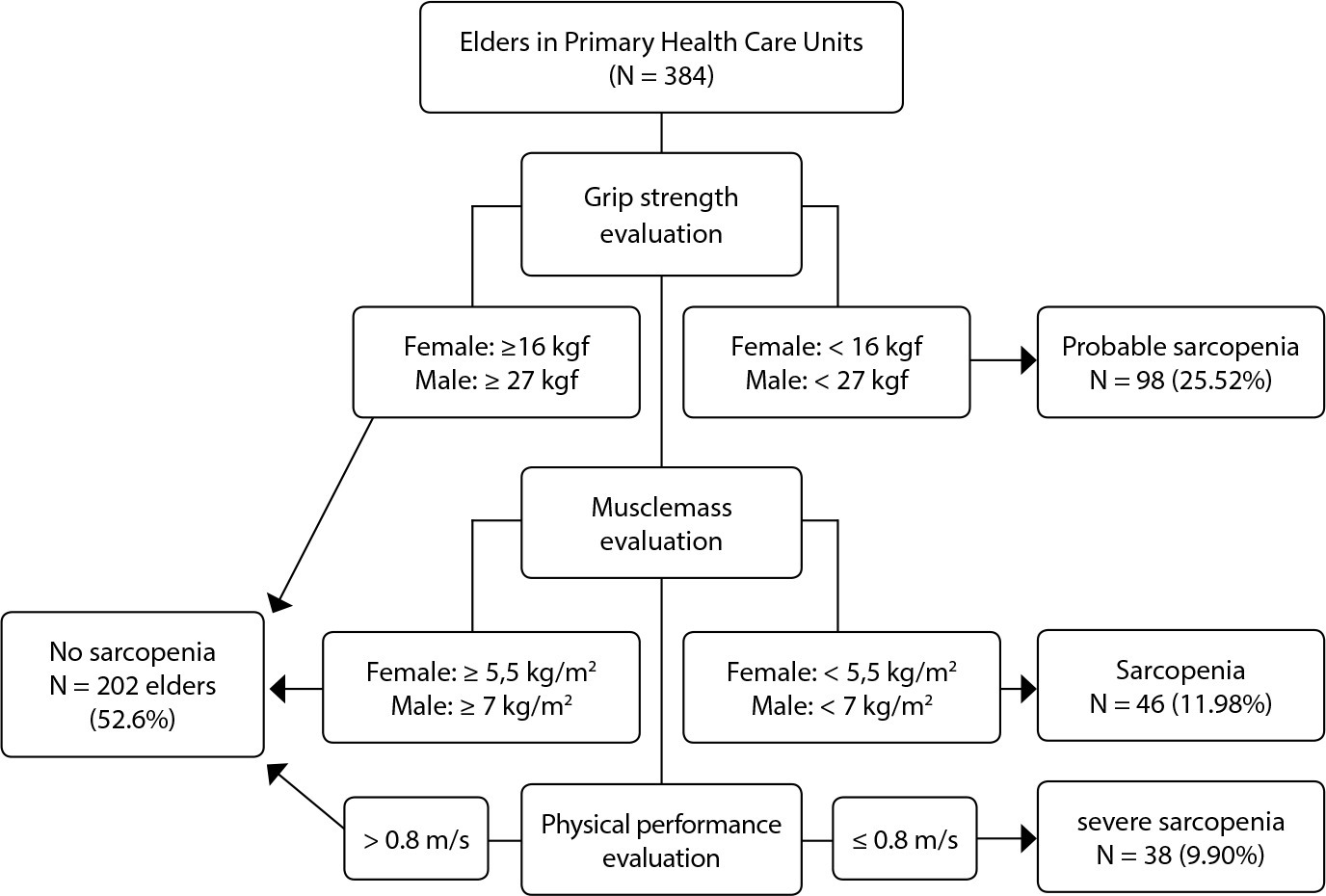
-
ORIGINAL ARTICLE10-09-2023
Independent and combined effects of lifestyle behaviors on adolescent health-related quality of life
Revista Brasileira de Enfermagem. 2023;76(4):e20220780
Abstract
ORIGINAL ARTICLEIndependent and combined effects of lifestyle behaviors on adolescent health-related quality of life
Revista Brasileira de Enfermagem. 2023;76(4):e20220780
DOI 10.1590/0034-7167-2022-0780
Views0See moreABSTRACT
Objective:
To investigate the independent and combined effects of lifestyle behaviors, including physical activity, sedentary behavior, sleep duration and food intake, in the health-related quality of life (HRQoL) of Brazilian adolescents.
Methods:
Cross-sectional school-based study, with the participation of 306 adolescents aged 14 to 18 years. A questionnaire was applied with structured questions to collect lifestyle behaviors data. Perception of the HRQoL was identified using the Kidscreen-27. The study used covariance analysis and linear regression models for statistical analysis.
Results:
Adolescents who reported ≤ 2 hours/day of screen-based sedentary behavior and sleep duration equivalent to 8-10 hours/night presented significantly higher HRQoL. Adolescents who reported joint adherence ≥ 3 healthy lifestyle behaviors demonstrated approximately two [OR=2.12] to three times [OR=3.04] more chance of presenting higher perceptions of HRQoL.
Conclusion:
Although healthy lifestyle behaviors had a positive independent effect on HRQoL, joint adherence to healthy behaviors enhances the cumulative effect.

-
ORIGINAL ARTICLE12-04-2023
Assessment of the components of sarcopenia and quality of life perceived of individuals on hemodialysis
Revista Brasileira de Enfermagem. 2023;76(6):e20220677
Abstract
ORIGINAL ARTICLEAssessment of the components of sarcopenia and quality of life perceived of individuals on hemodialysis
Revista Brasileira de Enfermagem. 2023;76(6):e20220677
DOI 10.1590/0034-7167-2022-0677
Views1See moreABSTRACT
Objectives:
to evaluate the prevalence of sarcopenia in individuals aged 50 years or older on hemodialysis; to verify the association between sarcopenia and sociodemographic, clinical, anthropometric factors, components of sarcopenia and quality of life (QoL); and to correlate the components of sarcopenia with QoL.
Methods:
Participated 83 individuals on hemodialysis. Sarcopenia was established according to the current European consensus. Dynamometry to determine strength, calf circumference (CC) and appendicular skeletal muscle mass index (ASMMI) to obtain muscle mass and gait speed (GS) for physical performance. For QoL used the WHOQOL-bref.
Results:
the prevalence of sarcopenia was 32.6% (CC) and 18.1% (ASMMI). There was no association between sarcopenia and QoL. Both handgrip strength (r=0.25) and GS (r=0.36) showed a correlation with physical domain.
Conclusions:
sarcopenia was expressive, and the aspects of functionality determine the physical impairment in this population.
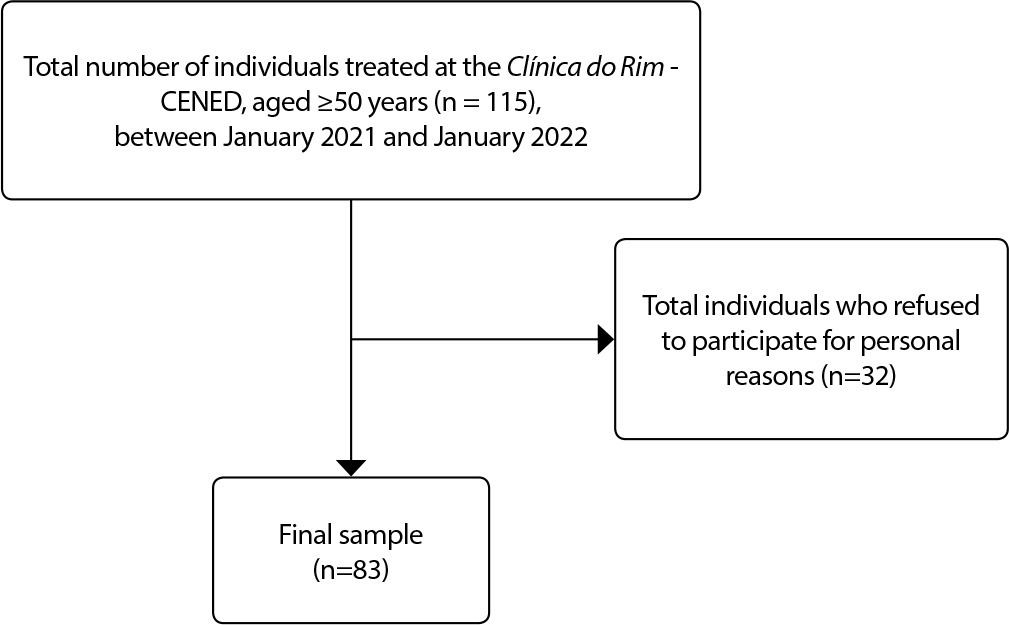
-
12-04-2023
Sleep quality of nurses who worked in coping with COVID-19: an integrative review
Revista Brasileira de Enfermagem. 2023;76(6):e20230007
Abstract
Sleep quality of nurses who worked in coping with COVID-19: an integrative review
Revista Brasileira de Enfermagem. 2023;76(6):e20230007
DOI 10.1590/0034-7167-2023-0007
Views0See moreABSTRACT
Objective:
to analyze sleep quality of nurses who worked coping with COVID-19 in scientific evidence.
Methods:
an integrative review, carried out in seven databases, including studies between December 2021 and June 2022, without language restrictions. The sample consisted of 15 primary studies.
Results:
nurses working in hospital, intensive care, outpatient care and teaching institutions constitute a vulnerable group for sleep disorders: latency, duration, efficiency and quality. The disorders identified involved insomnia at varying levels of severity: daytime dysfunction and morning sleepiness. Night work and low capacity for self-care were determinants of impaired sleep patterns.
Final considerations:
the COVID-19 pandemic contributed to greater vulnerability of nurses to changes in sleep, requiring strategies for risk management and well-being promotion.

-
ORIGINAL ARTICLE07-10-2020
Quality of life, depressive and minor psychiatrics symptoms in nursing students
Revista Brasileira de Enfermagem. 2020;73:e20190134
Abstract
ORIGINAL ARTICLEQuality of life, depressive and minor psychiatrics symptoms in nursing students
Revista Brasileira de Enfermagem. 2020;73:e20190134
DOI 10.1590/0034-7167-2019-0134
Views0See moreABSTRACT
Objective:
To assess quality of life, prevalence of depressive and minor psychiatric symptoms in Nursing students.
Methods:
Cross-sectional study, conducted from March to April 2018, at a federal university. Sample composed of 242 Nursing students, from the 1st to the 8th semester. Data was collected using the quality of life instruments, Beck Depression Inventory and Self-Report Questionnaire. A significance level of 0.05 was considered.
Results:
The mean age was 22.9 ± 5.1 years. It was found that 25% of the students had severe depressive symptoms and 54% of the students had minor psychiatric disorders, with a higher prevalence in the first semesters. An inverse relationship was observed between the frequency of depressive symptoms and quality of life scores (p = 0.05).
Conclusion:
Nursing students showed a high prevalence of depressive symptoms, indicating the importance of implementing actions to promote and prevent mental health.
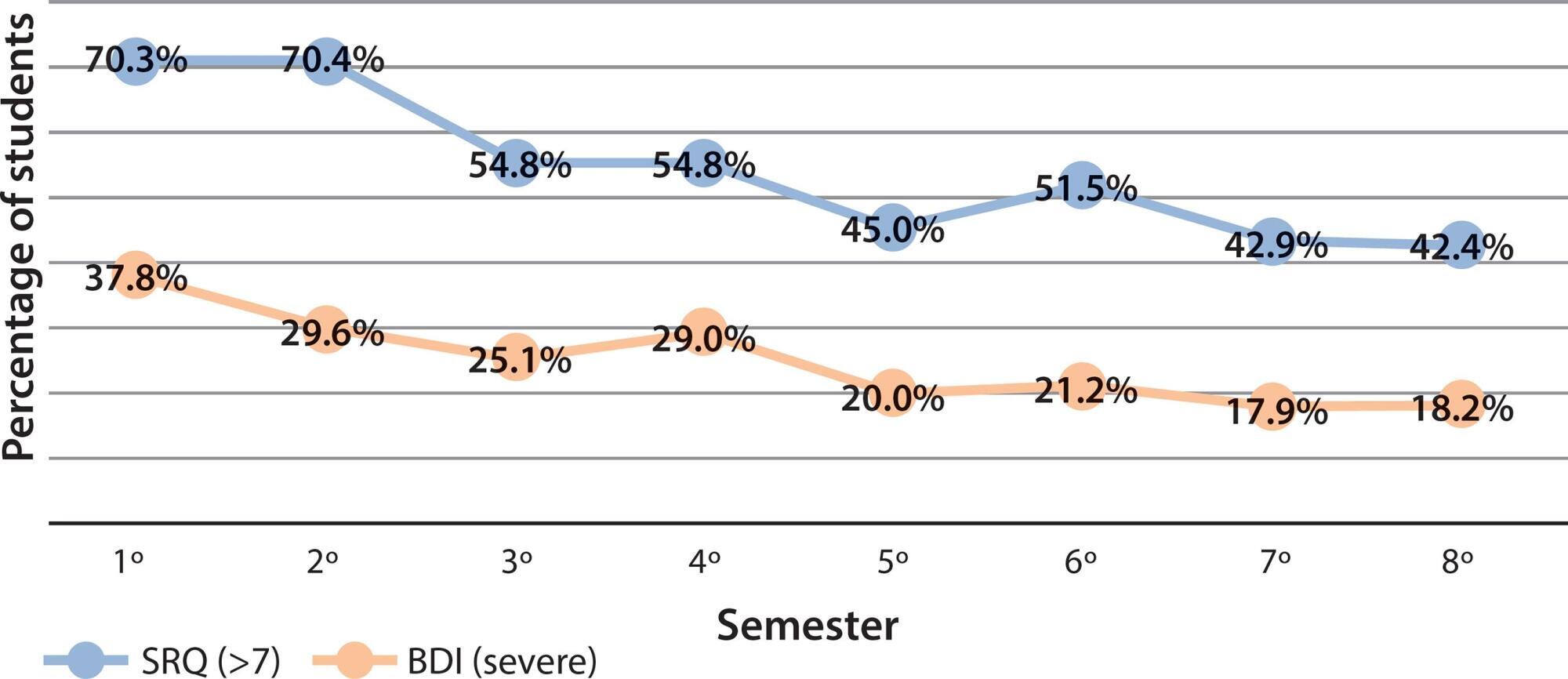
-
ORIGINAL ARTICLE08-07-2020
Permanent education and matrix support in primary health care: family health routine
Revista Brasileira de Enfermagem. 2020;73(6):e20190076
Abstract
ORIGINAL ARTICLEPermanent education and matrix support in primary health care: family health routine
Revista Brasileira de Enfermagem. 2020;73(6):e20190076
DOI 10.1590/0034-7167-2019-0076
Views1See moreABSTRACT
Objective:
To analyze the understanding of the professionals working on the Family Health Support by about permanent education and matrix support in the daily routine of primary health care.
Methods:
Descriptive research with a qualitative approach. Data were collected through semi-structured interviews with the participation of 19 professionals from different backgrounds. The results were organized based on Thematic Content Analysis.
Results:
Thematic categories emerged from the analysis: Permanent Health Education: knowledge and daily activities; Matrix support as a premise of Permanent Health Education; The principle of integrality as the foundation of the supporting teams; Conditions of praxis in the promotion of Permanent Health Education.
Final Considerations:
The study evidenced that professionals experience their routines within the service and that the sharing of knowledge to transform the reality of users and the territory is based on matrix support and integrality. However, they face structural difficulties in carrying out actions.
-
ORIGINAL ARTICLE10-01-2022
Frailty in the elderly: screening possibilities in Primary Health Care
Revista Brasileira de Enfermagem. 2022;75(2):e20200973
Abstract
ORIGINAL ARTICLEFrailty in the elderly: screening possibilities in Primary Health Care
Revista Brasileira de Enfermagem. 2022;75(2):e20200973
DOI 10.1590/0034-7167-2020-0973
Views0See moreABSTRACT
Objectives:
to evaluate two instruments for screening frailty in the elderly in Primary Health Care.
Methods:
this is an observational, cross-sectional study, with a quantitative approach, with 396 elderly people. SPSS software helped to perform the statistical analyses. The study used the kappa coefficient and Spearman’s correlation.
Results:
the kappa coefficient between the Clinical-Functional Vulnerability Index 20 and the Edmonton Frailty Scale was 0.496, considered moderate. There was a positive and significant correlation (r = 0.77; p < 0.001) between the frailty conditions and the total score of the two instruments.
Conclusions:
when this article assessed fragility through the kappa coefficient, both instruments presented positive correlation and agreement. However, the identification of frailty was higher when it used the Edmonton Frailty Scale.
-
ORIGINAL ARTICLE02-17-2020
Social network of children with cronic disease: knowledge and practice of nursing
Revista Brasileira de Enfermagem. 2020;73(2):e20180371
Abstract
ORIGINAL ARTICLESocial network of children with cronic disease: knowledge and practice of nursing
Revista Brasileira de Enfermagem. 2020;73(2):e20180371
DOI 10.1590/0034-7167-2018-0371
Views0See moreABSTRACT
Objectives:
To identify the knowledge and practice of primary care nurses about the social network approach for families of children with chronic diseases.
Methods:
Qualitative research, conducted by means of interviews with 23 family health nurses, from one municipality in Paraíba and one in Rio de Janeiro, from June to July of 2017. The data were interpreted using thematic analysis.
Results:
Social network meant institutional support offered by services outside the unit, and socioeconomic problems involved the family context. In practice, nurses find it difficult to provide comprehensive care and establish ties with families. When referring to other professionals, a weakness in the counter-referral to the family health unit is found.
Final considerations:
Some gaps were found regarding the knowledge and practice of nurses regarding the social network approach, which requires professional training to strengthen social relationships and the necessary support for families of children with chronic diseases.
-
ORIGINAL ARTICLE10-21-2019
Inclusion of mental health in primary health care: care strategy in the territory
Revista Brasileira de Enfermagem. 2019;72(6):1677-1682
Abstract
ORIGINAL ARTICLEInclusion of mental health in primary health care: care strategy in the territory
Revista Brasileira de Enfermagem. 2019;72(6):1677-1682
DOI 10.1590/0034-7167-2018-0806
Views0See moreABSTRACT
Objective:
To analyze the strategies, challenges and possibilities of the articulation between mental health and primary health care from the perspective of health managers.
Method:
Exploratory, qualitative research carried out with 28 managers of mental health and primary care. The data were collected through semi-structured interviews between July and November 2013 and submitted to thematic content analysis.
Results:
The inclusion of mental health actions in primary care made it possible, in the view of managers, to increase users’ access to the care they need. This care strategy allows the extension of care practices in the territory, with matrix support as the main tool for the implementation of this care strategy.
Final considerations:
The articulation between primary care and mental health is a powerful device for psychosocial care, but it demands a new conformation of the Psychosocial Care Centers (Caps) and primary care services.
-
ORIGINAL ARTICLE12-05-2019
Evaluation of delirium in aged patients assisted at emergency hospital service
Revista Brasileira de Enfermagem. 2019;72:153-160
Abstract
ORIGINAL ARTICLEEvaluation of delirium in aged patients assisted at emergency hospital service
Revista Brasileira de Enfermagem. 2019;72:153-160
DOI 10.1590/0034-7167-2018-0386
Views0See moreABSTRACT
Objective:
identify the occurrence of delirium in aged patients assisted in emergency services and verify its relationship with sociodemographic and clinical variables.
Method:
cross-sectional, prospective study with a quantitative approach. Two hundred aged hospitalized patients participated. The Confusion Assessment Method was used for data collection. For statistical analysis, chi-square tests, likelihood ratio and Fisher’s test were used, with a significance level of 5%.
Results:
male gender and mean age of 71.8 years were predominant. In the first 24 hours of hospitalization, 56 (28%) aged individuals presented delirium. An association of the disease with lack of physical activity, presence of a caregiver, hypertension, dyslipidemia and cerebrovascular diseases was identified.
Conclusion:
Delirium was associated with no physical activity, the need of a caregiver, and the presence of comorbidities. The importance of conducting other studies that may lead to early identification of the condition to prevent its complications is emphasized.
-
ORIGINAL ARTICLE10-28-2020
Conflict management strategies used by Portuguese nurse managers
Revista Brasileira de Enfermagem. 2020;73:e20190336
Abstract
ORIGINAL ARTICLEConflict management strategies used by Portuguese nurse managers
Revista Brasileira de Enfermagem. 2020;73:e20190336
DOI 10.1590/0034-7167-2019-0336
Views0See moreABSTRACT
Objectives:
to analyze the perception and conflict management strategies used by nurses in the management of people in Portuguese health services.
Methods:
descriptive, correlational study, carried out in Portuguese health services, with an intentional non-probabilistic sample, totaling 95 nurse managers. A questionnaire and Conflict Management Scale were used, analyzing the variables of managerial activities and conflict management, with the aid of software.
Results:
it was identified that 60% of the managers, report having to mediate conflicts daily, and the majority report adopting dialogue in conduct. However, through the Kruskal-Wallis test, it was shown that enforcement strategies in conflict management prevail (p = 0.008), with collaborative ones being more restricted to monthly intervals (p = 0.049).
Conclusions:
managers perceive the importance of collaboration in the mediation of conflicts, however, in their daily lives; they tend to maintain imposing behaviors, signaling for a little transformational leadership style.

-
03-15-2021
Advanced Practice Nursing in Latin America and the Caribbean: seeking its implementation
Revista Brasileira de Enfermagem. 2021;74:e74suppl601
Abstract
Advanced Practice Nursing in Latin America and the Caribbean: seeking its implementation
Revista Brasileira de Enfermagem. 2021;74:e74suppl601
DOI 10.1590/0034-7167.202174suppl601
Views1Healthcare organizations are increasingly complex and specialized, seeking to optimize their quality and safety standards, and be able to meet the growing needs of their users. To face this reality, health professionals need to adapt to respond in time to the demands of the health context. In turn, the World Health Organization (WHO), through the […]See more
Search
Search in:
Nuvem de Tags
Adolescente (85) Atenção Primária à Saúde (239) COVID-19 (91) Criança (91) Cuidados de Enfermagem (269) Educação em Enfermagem (151) Educação em Saúde (139) Enfermagem (930) Enfermagem Pediátrica (86) Estudantes de Enfermagem (77) Estudos de Validação (131) Família (87) Idoso (208) Promoção da Saúde (99) Qualidade de Vida (104) Saúde do Trabalhador (86) Saúde Mental (145) Saúde Pública (82) Segurança do Paciente (150) Tecnologia Educacional (100)



